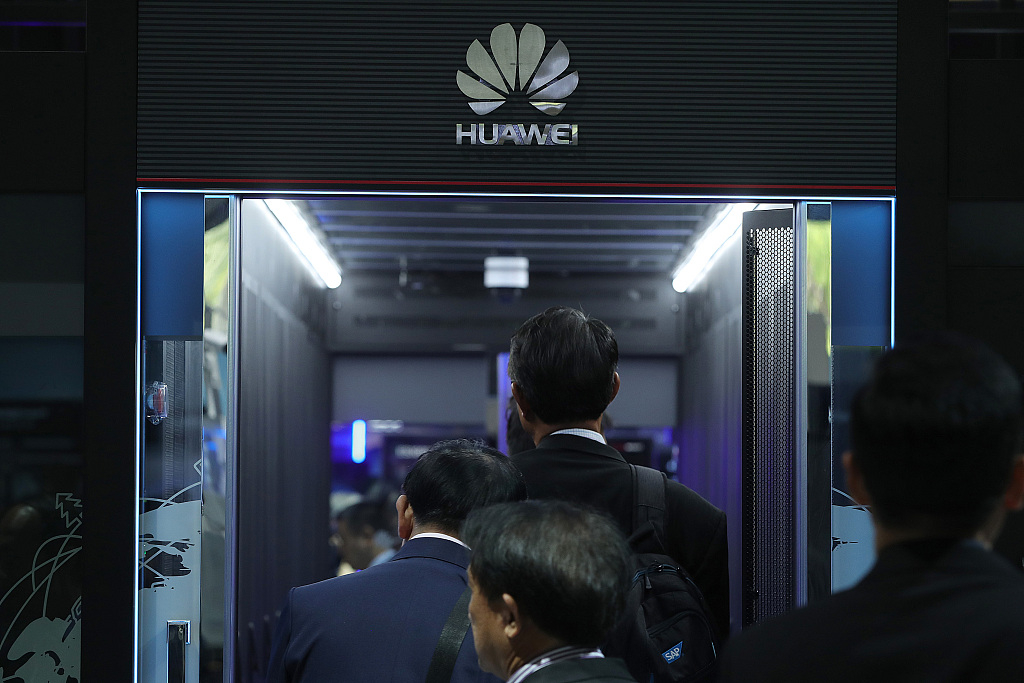
Editor's note: Tom Fowdy graduated from Oxford University's China Studies Program and majored in politics at Durham University. He writes about international relations focusing on China and the Democratic People's Republic of Korea. The article reflects the author's opinions and not necessarily the views of CGTN.
German lawmakers on Wednesday, with collaboration of the Bundestag's two largest parties, the Christian Democratic Union and the Social Democratic Party, sought to draft a bill, which seeks to indirectly ban the Chinese Telecommunications Huawei outright from its 5G internet networks.
The motion seeks to openly rebel against Chancellor Angela Merkel who has been happy to include the company within Berlin's next generation internet and uphold stability in ties with Beijing, despite pressure from the United States to ban it.
The administration had approved cyber security standards and rules for such networks, but critics have insisted this is "not enough" demanding that the "politics of the country of origin" also be criteria for inclusion, an indirect attack against China.
Banning Huawei from German networks so abrasively and against the advice of the government will pose significantly negative consequences for the country's national interests and diplomacy.
First of all, this will bring Berlin into a state of diplomatic tension and unease with multiple countries, this includes the U.S., Russia, the UK and China, three of which will represent a narrowing of the country's economic options. Secondly, Germany's own economy is moribund and the country cannot afford a freezing in ties with Beijing due to its lucrative export markets.
Thirdly, banning Huawei sends a hypocritical message to China in its demand for the country to offer greater market access and concessions to German companies. This is an impulsive, ill-thought through rebellion, which will jettison crucial stability between two powerhouses essential to Eurasia's economic future.

Attendees arrive at the Huawei Technologies Co. exhibition stand at the CeBIT 2018 tech fair in Hanover, Germany, June 11, 2018./ VCG Photo
Attendees arrive at the Huawei Technologies Co. exhibition stand at the CeBIT 2018 tech fair in Hanover, Germany, June 11, 2018./ VCG Photo
Germany's foreign policy is already teetering on the edge. At every angle, it is met with extreme levels of uncertainty. Across the sea, Britain is now certain to go through with Brexit following Boris Johnson's electoral victory. This will pose economic and strategic challenges to Germany by weakening continental order and hurting trade.
Further across the Atlantic, the Trump administration has seen U.S.-German relations fall to post-war lows by having launched a trade war against the European Union and been antagonistic to the ideals of NATO.
Public opinion of the United States in Germany has plummeted due to Trump's nationalist and populist views, they are increasingly seen as an unreliable "frenemy" that cannot be trusted to secure Berlin's interest. Then thirdly, Germany has to face Russia, a traditional economic partner, to which it has been forced to place sanctions due to the crisis in Ukraine.
This scenario means the country's diplomatic options beyond the EU are extremely slim. Yet, Berlin lawmakers now want to pursue a path of antagonism against China by banning Huawei against the recommendations of their own government. With Germany's own economy only narrowly avoiding recession with a 0.1 percent growth in the last quarter and Eurozone GDP also sluggish, this is a disastrous decision full of unprecedented risks.
For good reason, Angela Merkel has, on a personal level, sought to keep relations stable with China. Whilst that does not mean they agree on absolutely everything, Merkel is a wise diplomat and prudent politician who opts for stability and pragmatism in the pursuit of her national interests.
There are things she wants to gain from Beijing, including commitments on market access and climate, but she is well aware a path of inflammatory confrontation cannot achieve that. She understands that Germany and China as two major economic powers have to work together.
In light of this, a Huawei ban sends the wrong message. How can Berlin opt for greater market access within China if it is banning Chinese companies at home on national security risk? They cannot demand fairness and reciprocity if they are not prepared to grant it themselves.
This position also puts Germany's lucrative exports to China, totaled at 786 billion euros, in a position of risk and uncertainty. This, coupled with the economic stagnation and other diplomatic spats outlined above, is a disastrous and self-defeating move. The two countries play an intrinsic role in the economic success and development of greater Eurasia, thus in this case, a proposed ban on Huawei will be a "lose-lose" move, which may have profound implications.
Germany must not give in to the hysteria and paranoia that has plagued other countries in the West, it must continue to stand up for its own interests within its traditional paradigm of reason, cool-headedness and calm. Lawmakers must thus understand why Merkel has chosen not to ban Huawei, and see the bigger picture.
(If you want to contribute and have specific expertise, please contact us at opinions@cgtn.com.)